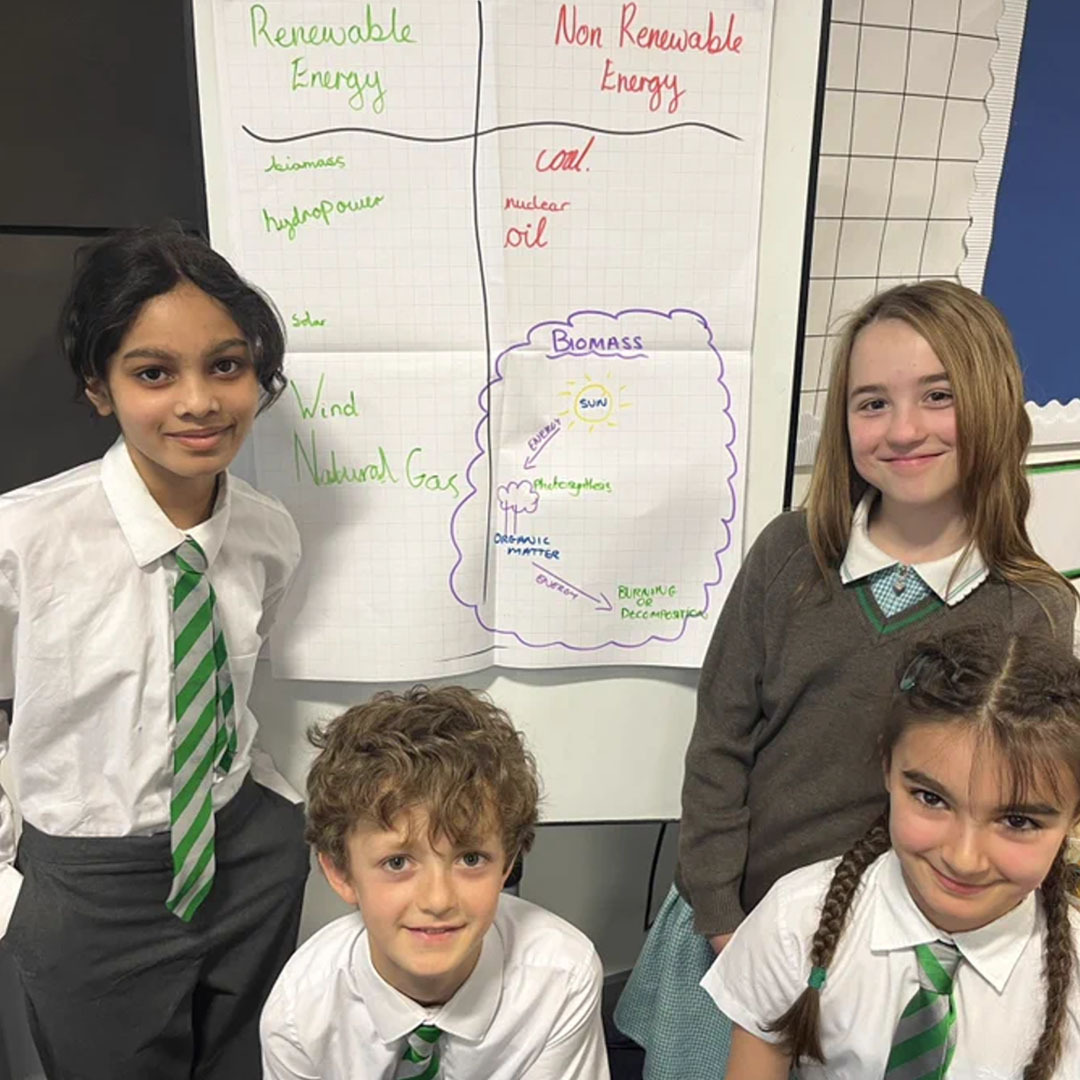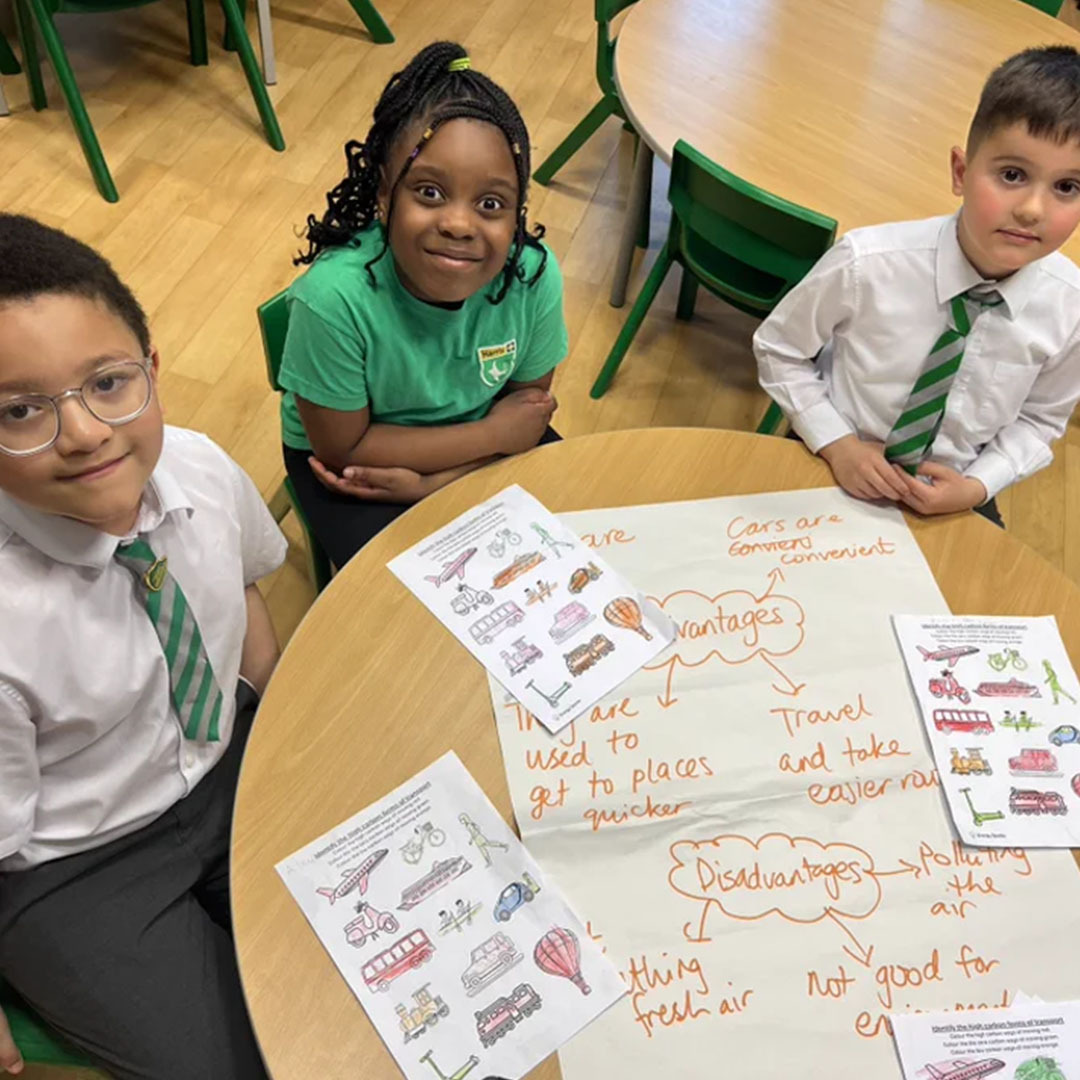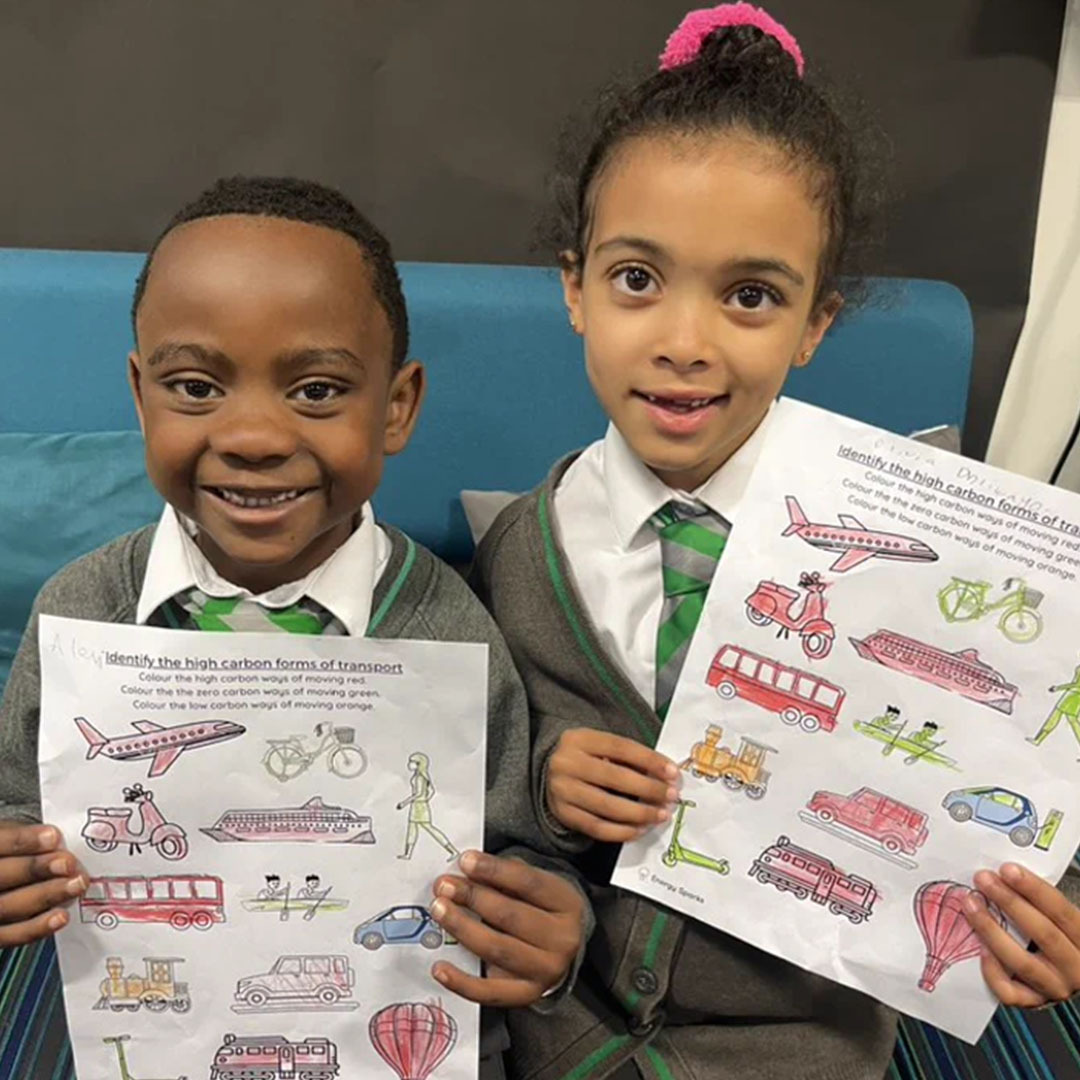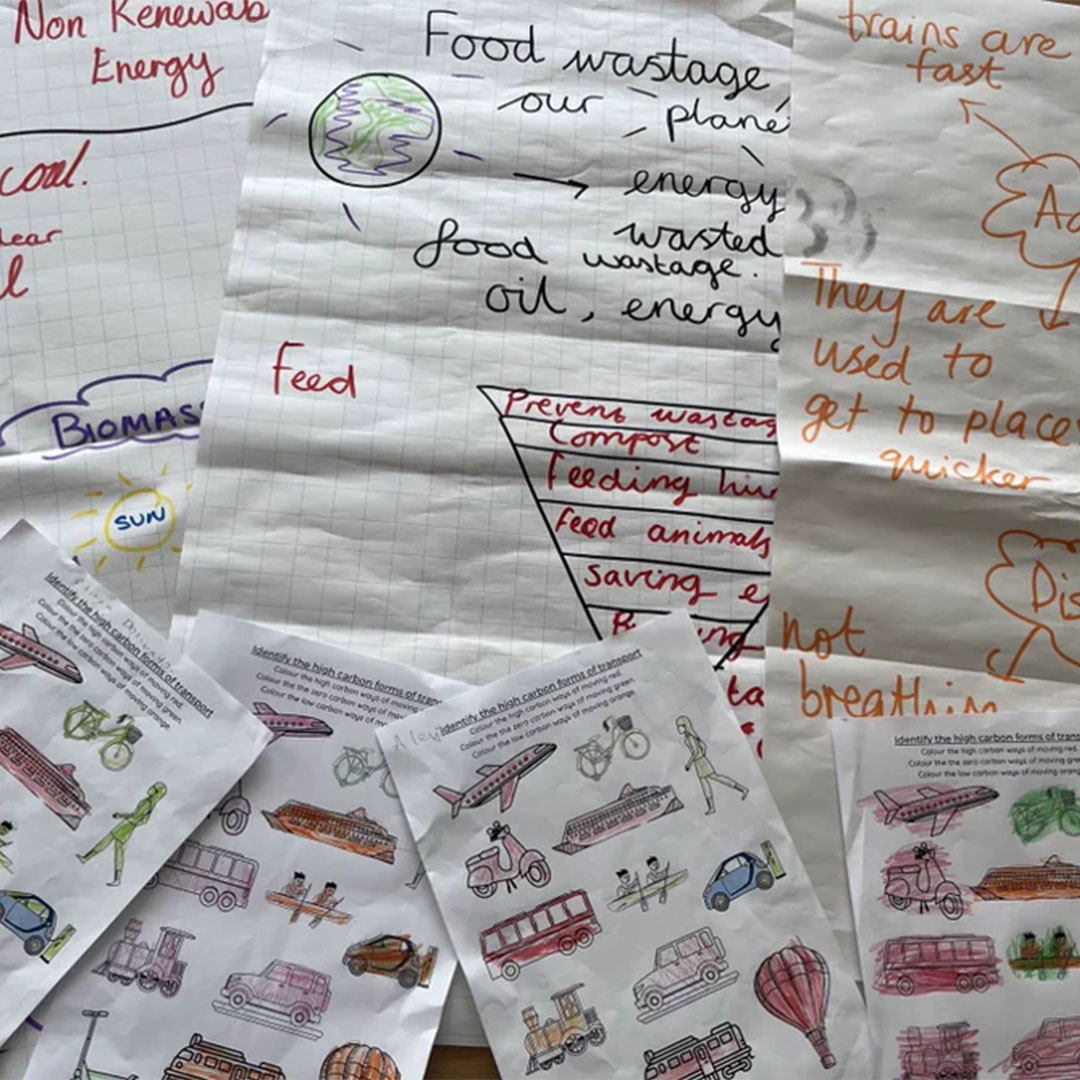Eco-Schools programme: Taking a whole school approach to green issues
Lots of young people care deeply about environmental issues but with many of these issues being on a global scale, it can be overwhelming for schools to help students develop their interest in protecting the planet. The Eco-Schools programme breaks some of these larger issues down into more manageable and directed themes that prompt young people to consider the everyday changes they can make to help the environment.
Harris Primary Academy Haling Park is one of our schools that have been leading the way with this programme, and are recognising the benefits of proactively focusing on green issues. We sat down with Rob Hyneman, Head of Academy, and Ruechel Smith, Geography Lead to discuss their experience with the programme.
 Year 5 Energy Savers exploring different energy sources comparing renewable and non-renewable options. The conversation extended to biomass and how this can be used for heating and electricity.
Year 5 Energy Savers exploring different energy sources comparing renewable and non-renewable options. The conversation extended to biomass and how this can be used for heating and electricity.
When did you start doing the Eco-Schools programme?
Rob: We started the last academic year, so September 2021. Ruechel wanted to explore some of the themes as part of the curriculum.
What were your reasons for applying for it?
Rob: Our pupil parliament, who were elected in September, decided they wanted their focus to be on climate change and how we were going to become greener as a school. The Green Flag award gave us a real direction as to how to do the work necessary. We got the Green Flag last year in July, and we got it again this year. This year we received Distinction. You have to do certain activities and you get points through the portal, where you need to submit evidence.
A lot of it complimented the Energy Sparks work we were doing alongside it. We received awards for our work this summer - we got top-performing school in London, and we came second nationally as an energy-saving school. We’re not sure how to spend the money we received yet, so we need to get some inspiration from the children. It will allow us to buy the resources we need to take it to the next level. It hasn’t cost a huge amount of money so far.
Can you describe the process?
Rob: You start with a pupil-led audit. There are eight different areas to choose from. We asked our pupil parliament members to fill in our questionnaires about the school’s green performance. Using the survey, you choose three out of eight topics to focus on. We chose the three we scored lowest on.
Ruechel: We did Energy, Biodiversity and Global Citizenship. For Biodiversity, we built bug hotels and bird houses. We have done the Bronze Award with the RSPB, so we’ve encouraged bee-friendly plants and gone out bird watching. The RSPB provides activities to do, so kids have gone out spotting at the weekends. A lot of this subject matter is already in the curriculum, it’s just that after school, kids will take things further if they’re enthusiastic.
I think our Pupil Parliament selected the theme of Global Citizenship because we were looking at charity as part of the Community Champions program, and collecting for food banks. Our charity is the Croydon Deaf Children’s Society, and it’s one that the children voted for. We’ve raised a lot of money for them over the year. So I think, at the time, that’s what had their attention.
We have Global Citizenship assemblies every week. We did the Countryside Code recently, with a Shaun the Sheep theme. And we got to apply it when we went to the park, because it was an outdoor space, and they remembered what to do from the assembly.
Rob: We do the Global Citizenship assemblies every Tuesday, and it’s with every class. And we take something from Picture News. It’s linked to British Values and Protected Characteristics. It gives our children an awareness of what’s going on in the world.
Ruechel: I’m really proud of the children and their enthusiasm for nature and for energy saving.
Rob: They love it. I would say our eco-committee is our most popular group, even more popular than Pupil Parliament.
 Year 2 Energy Savers explored the environmental impact of transport. They thought about the advantages and disadvantages of each mode of transport and then weighed these up against the carbon footprint they leave!
Year 2 Energy Savers explored the environmental impact of transport. They thought about the advantages and disadvantages of each mode of transport and then weighed these up against the carbon footprint they leave!
How do you think it's benefitted the school?
Rob: We want to teach the children about looking after the environment and the country. I’ve said in assembly many times that there are politicians and adults who say they’re going to try and sort out global warming, but ultimately the people it’s going to impact most are the little ones sitting on the floor. Potentially, though, they’re the ones who are going to make those big changes. So it’s given us a real focus to drive what we’re doing.
It’s easy for any school to claim to be eco-friendly, but this programme has given us precise activities that help us to make an impact. Global warming and trying to save the planet is such a huge topic, so you need to pin point exactly what you’re trying to do.
Is the programme mostly curricular or extra-curricular?
Rob: Quite a lot of the activities fit into the curriculum. In Year 5, for example, they look at a Brazilian town or city which is very sustainable, which is a good link. Many of the activities, though, are extra-curricular and driven by assemblies, Pupil Voice and Pupil Parliament. It’s driven by Pupil Parliament but it’s involved every child across the school.
 Year 1 Energy Savers also explored different types of transportation. They discussed which modes of transport released the largest amount of carbon. The message from Year 1 was to either walk, cycle or canoe to school!
Year 1 Energy Savers also explored different types of transportation. They discussed which modes of transport released the largest amount of carbon. The message from Year 1 was to either walk, cycle or canoe to school!
Other senior leaders may be worried that this will take a lot of time and resources. What would you say about these concerns?
Rob: This is a valid concern. Time is so limited in schools. Anything like this is a challenge. However, I think it’s well worth it. It fit well with what we’re hoping to do with the school. We’ve been lucky that we’ve had Ruechel as our green rep, who has been phenomenal at this.
One of the reasons we’ve been successful is that we learned from last year, when it felt a rush to get our application submitted for the July deadline. This year we made sure we planned it out, so it’s been a lot less stressful and it all happened a lot more naturally. For example, our plans for Earth Day ticked 6 or 7 of the boxes. We’ve thought carefully about the areas of curriculum it matches. If there’s a unit on water preservation, we’ve ensured that year group has been involved in the project area.
It’s important to avoid tokenism and ensure that ecological action is embedded in the curriculum. A lot of it is just about making sure that the links with the green flag are made explicit to everyone. It is time consuming, but if you plan it, it’s do-able.
What do the pupils enjoy most about the programme?
Rob: They most enjoyed having leadership over it. There was a real buzz in the meetings when we made decisions on the actions. I had a guiding hand, but it was the students driving it.
Ruechel: They had a great time at the London Wetlands Centre. They all want to be Guardians of Nature. They got a badge and a certificate.
 Each class used an assembly slot to focus on an Energy Sparks activity. The Pupil Parliament and Eco Committee met to feedback what they had found out.
Each class used an assembly slot to focus on an Energy Sparks activity. The Pupil Parliament and Eco Committee met to feedback what they had found out.
What are your plans for next year?
Ruechel: I’d like to really go further with biodiversity. Because when kids go to other places they realise that in our part of Croydon we don’t have as much in the way of wildlife. When we went to Beddington Park on a trip, the kids were really astounded by the birds. We had the identification sheet we used to work out what they were, and we went river dipping and we were surprised by the variety of species. We’ve had butterflies in the classroom as well.
Rob: We’ll also do the student questionnaires and surveys to work out their priorities, and continue to work on Energy Sparks.
I think the secret is that you need somebody really passionate to drive it. And we’re really lucky that it’s been Ruechel, but it’s also the fact that there’s been buy-in from the leadership team too. You can’t leave it just to one person to drive it. And our site manager, Andy, has been fantastic about letting the kids look around the building. It fit well with one of his targets, which was to reduce energy usage. We have genuinely taken a whole school approach. I think any child here would tell you about Energy Sparks and the Green Flag award if you asked about the academy, and that’s because they’ve all contributed. Even if that’s just telling me to turn off the lights after assembly!
Connect with us…
and stay up to date with all things Harris Careers!




